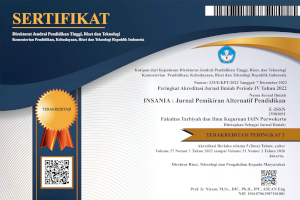Objek Assesmen Proses dan Hasil Belajar: Ranah Kognitif, Psikomotor dan Afektif
Objek Assesmen Proses dan Hasil Belajar: Ranah Kognitif, Psikomotor dan Afektif
DOI:
https://doi.org/10.24090/insania.v22i2.1222Keywords:
Objects Assessment of learning outcomes, bloom taxonomy, Early Childhood Education.Abstract
In the national education system the formulation of educational objectives, both curricular and instructional objectives, uses the classification of learning outcomes from Benjamin Bloom which broadly divides it into three domains, namely: cognitive domain, affective domain, and skill domain. Based on the assessment, educators and the parent can obtain information on progress achievements to illustrate the attitudes, knowledge, and skills of the child has learning. Three aspects of the assessment of the object learning process and outcomes are also applied in early childhood education in STPPA or standards of child development achievement level formulated in core competencies, basic competencies and indicators.Downloads
References
Musial, Dian. dkk. 2009. Foundations of Meaningful Educational Assessment. Boston: McGraw-Hill.
Permendikbud Nomor 146 Tahun 2014 tentang Kurikulum 2013 Pendidikan Anak Usia Dini, Lampiran V tentang Penilaian.
Permendikbud Nomor 146 Tahun 2014 tentang Kurikulum 2013 Pendidikan Anak Usia Dini, Lampiran IV tentang Pembelajaran.
Sudjana, Nana. 2002. Penilaian hasil Proses Belajar Mengajar. Bandung: Remaja Rosdakarya.
Sukiman. 2012. Pengembangan sistem evaluasi. Yogyakarta: Insan Madani
Utari, Retno.¬¬¬¬_____. Taksonomi Bloom: Apa dan Bagaimana Menggunakannya. Dalam http://www.bppk.depkeu.go.id yang dunduh pada tanggal 29 Maret 2017.
Downloads
Published
How to Cite
Issue
Section
License
Authors who publish with this journal agree to the following terms:
Authors retain copyright and grant the journal right of first publication with the work simultaneously licensed under a Creative CommonsAttribution-ShareAlike License that allows others to share the work with an acknowledgment of the work's authorship and initial publication in this journal.
Authors are able to enter into separate, additional contractual arrangements for the non-exclusive distribution of the journal's published version of the work (e.g., post it to an institutional repository or publish it in a book), with an acknowledgment of its initial publication in this journal.
Authors are permitted and encouraged to post their work online (e.g., in institutional repositories or on their website) prior to and during the submission process, as it can lead to productive exchanges, as well as earlier and greater citation of published work (See The Effect of Open Access).








